Fundamentals of military service. The officer does not perform the duties of military service, in the case. i) citizens studying by correspondence in educational institutions - for the period of examination and credit sessions and writing a thesis
In conditions of a sharp aggravation of social contradictions, the role of legal regulation of the construction and use of the army is growing. The policy of military development clearly shows that military problems cannot be solved without taking into account economic, legal and social problems.
Service in the army is always associated with hardships and difficulties, with various kinds of dangers to the health and life of servicemen. And therefore it is very important that a person in uniform be reliably socially protected, so that every serviceman knows about the benefits and guarantees provided to him and his family by the state. This is especially true now, when military personnel Russian army, internal troops, troops of other ministries and departments, remaining true to the oath, fulfill their military duty in "hot spots", where it is dangerous, where blood is shed and where they are needed as a guarantor of peace and security (Tajikistan, Chechnya, Abkhazia). Yes, and military families sometimes have a hard time, and this, perhaps, is no secret to anyone - housing problems, the remoteness of units and subunits from a large civilization and, as a result, the inability for wives to get a job in their specialty, to send children to children's institutions or to a good school . And, finally, a whole range of social problems caused by political and economic instability in the near abroad, and in Russia itself. The state, taking into account the nature and complexity of military service, has established a number of benefits, guarantees and compensations for military personnel and members of their families in matters of material support, housing, transport services, for obtaining loans for individual housing construction and other acute social problems. These benefits and compensations are established and enshrined in federal laws "On Defense", "On military service and military service", "On the status of military personnel", "On veterans", other legislative acts. The law is only a guarantor of the rights granted when it is strictly implemented. An obstacle on this path is often the lack of legal literacy of military personnel and officials obliged by law to comply with the legislation on benefits.Therefore, the awareness of military personnel about their rights, publicity in the practice of their provision are important condition protection of these rights and benefits.
Legal basis military duty and military service V Russian Federation are:
the Constitution of the Russian Federation;
Federal law "On military duty and military service";
Federal Law "On the Status of Servicemen";
Federal Law "On Defense";
Federal Law "On Veterans";
General military charters of the Armed Forces of the Russian Federation;
Regulations on the procedure for military service;
Other governing documents, legislative acts of the Russian Federation in the field of defense, conscription, military service and the status of military personnel, international treaties of the Russian Federation.
Article 59 Constitution of the Russian Federation establishes that the defense of the fatherland is the duty of a citizen of the Russian Federation. Federal Laws of May 27, 1998 No. "On the status of military personnel" and dated March 28, 1998. "On Military Duty and Military Service" defines in detail the totality of rights, freedoms, duties and responsibilities of military personnel, the system military registration and preparation of a citizen for military service, conscription of citizens for military service, entry into service under a contract and military service in the reserve. The Law of the Russian Federation "On Military Duty and Military Service" provides legal regulation in the field of military duty and military service in order to fulfill the constitutional duty and duty of protecting the Fatherland by the citizens of the Russian Federation.
Federal Law of May 31, 1996 No. "On Defense" defines the foundations and organization of the defense of the Russian Federation, the powers of state authorities of the Russian Federation, the functions of state authorities of the constituent entities of the Russian Federation, organizations and their officials, the rights and obligations of citizens of the Russian Federation in the field of defense, the forces and means involved in defense, responsibility for violating legislation of the Russian Federation in the field of defense, as well as other norms relating to defense. This Law logically continues and develops the earlier adopted laws, takes into account the changes that have taken place in the structure government controlled V last years, and real conditions today, requiring the fulfillment of tasks to ensure the reliable security of the country.
Federal Law of January 12, 1995 "On Veterans" establishes legal guarantees social protection veterans in the Russian Federation in order to create conditions that provide them with a decent life, vigorous activity honor and respect in society.
Charter of the Internal Service of the Armed Forces of the Russian Federation defines the general rights and duties of the military personnel of the Armed Forces and the relationship between them, the duties of the main officers of the regiment and its units, as well as the rules of internal order.
All military personnel are guided by the internal service charter military units, ships, headquarters, departments, institutions, enterprises, organizations and military educational institutions vocational education* Armed Forces of the Russian Federation. The provisions of the Charter, including the duties of officials of the regiment and its subunits, apply equally to servicemen of all military units, ships and subunits.
The Charter applies to servicemen of the border troops, internal troops of the Ministry of Internal Affairs, railway troops, civil defense troops, servicemen of the system of federal state security bodies, the main directorate of protection of the Russian Federation, federal agency government communications and information under the President of the Russian Federation, the State Fire Service of the Ministry of Internal Affairs, Affairs and other ministries and departments of the Russian Federation.
On ships internal service and duties of officials are additionally determined by the Ship Charter of the Navy.
Regulations on the procedure for military service determines the procedure for citizens of the Russian Federation to perform military service on conscription and on a voluntary basis (under contract) in the Armed Forces of the Russian Federation, other troops, military formations and bodies, military units of the State Fire Service of the Ministry of the Russian Federation for Civil Defense, emergencies and elimination of consequences
natural disasters provided federal law“On military duty and military service”, in peacetime, the procedure for concluding a contract for military service (hereinafter referred to as the contract) and terminating it, as well as other issues that are
in accordance with federal laws are within the scope of its regulation.
Recruitment of the Russian Armed Forces by officers.
The content and procedure for the performance of duties of military service by officers.
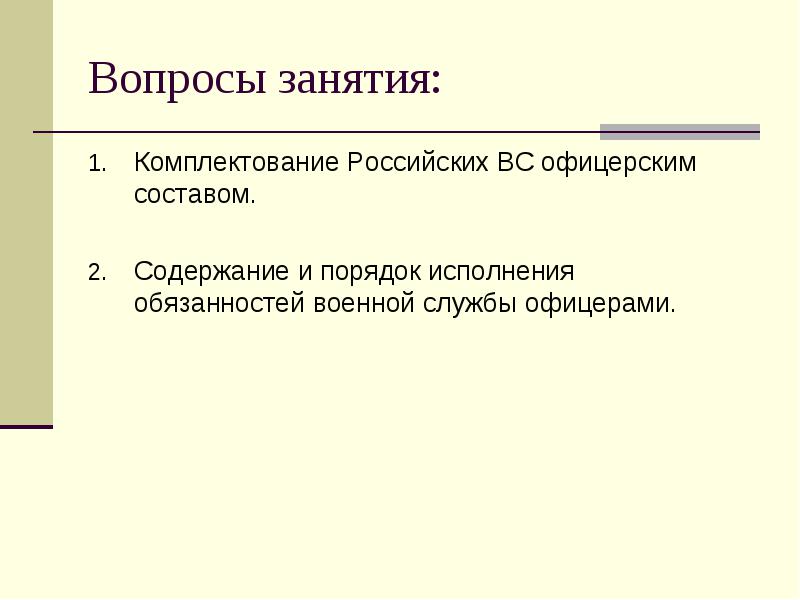
The procedure for military service by officers is determined by the laws of the Russian Federation, the charters of the Armed Forces of the Russian Federation, orders of the Ministry of Defense of the Russian Federation, directives of the General Staff of the Armed Forces of the Russian Federation and other regulatory documents.
Federal Law No. 53-FZ of March 28, 1998
(as amended on 12/21/2009)
"On military duty and military service"
(adopted by the State Duma of the Federal Assembly of the Russian Federation on March 6, 1998)
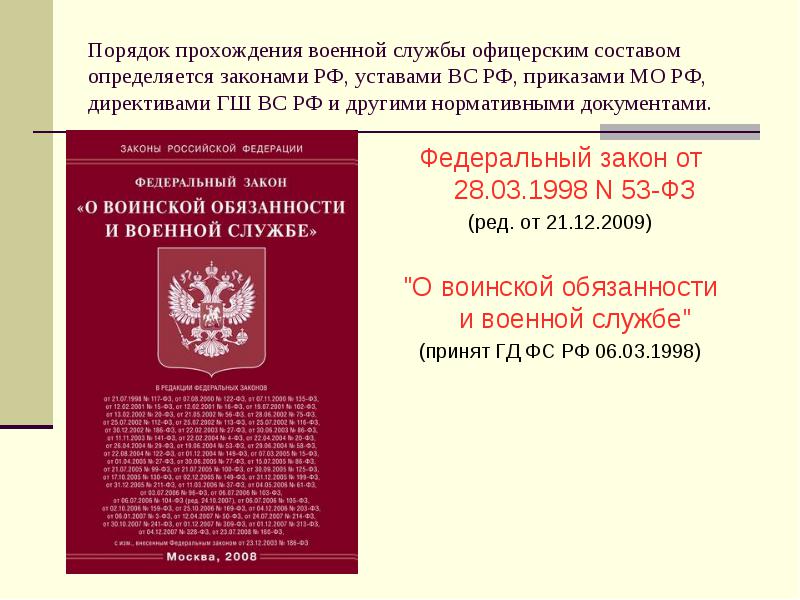
Officer - a soldier with a military rank from junior lieutenant and above.
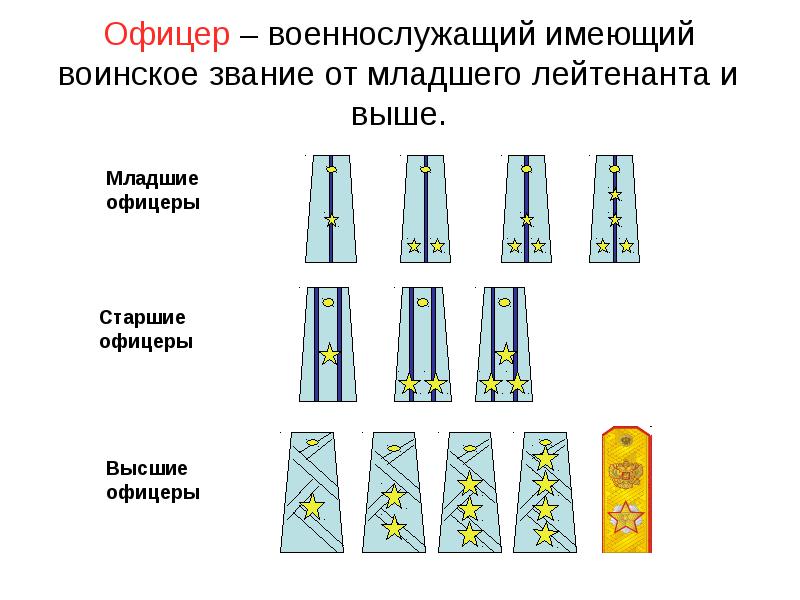
The officer is prohibited from:
use for purposes not related to the performance of duties of military service, the financial resources and property of a military unit, as well as other state property, with the exception of cases when the said property is used for a fixed fee, in accordance with federal laws and other regulatory legal acts of the Russian Federation;
engage in other paid activities, with the exception of pedagogical, scientific and other creative activities, if it does not interfere with the performance of military service duties. At the same time, pedagogical, scientific and other creative activities cannot be financed exclusively at the expense of funds from foreign states, international and foreign organizations, foreign citizens and stateless persons, unless otherwise provided by an international treaty of the Russian Federation or the legislation of the Russian Federation;
engage in entrepreneurial activities personally or through proxies, including participation in the management of commercial organizations, except for cases where direct participation in the management of these organizations is included in official duties serviceman, as well as assist individuals and legal entities in the implementation entrepreneurial activity using his official position;
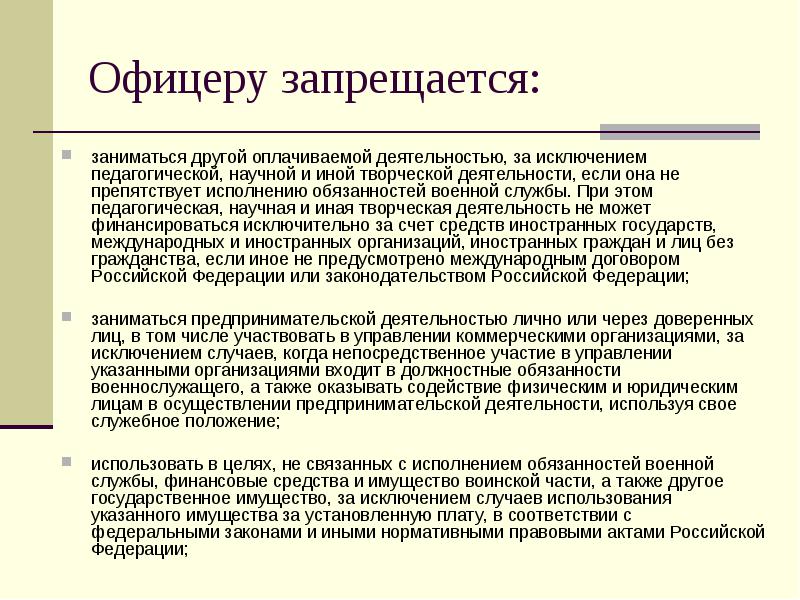
The officer is prohibited from:
receive royalties for publications and speeches related to the performance of military service duties;
accept, without the permission of the President of the Russian Federation, awards of foreign states, international and foreign organizations;
use his official position in the interests of political parties and public, including religious, associations, as well as to promote attitudes towards them;
receive from individuals and legal entities remuneration (gifts, monetary rewards, loans, services, payment for entertainment, recreation, transportation costs and other remuneration) associated with the performance of military service duties, with the exception of valuable gifts (including nominal ones) and monetary amounts awarded to military personnel as incentives in accordance with general military regulations;
go on business trips abroad at the expense of individuals and legal entities, with the exception of business trips carried out in accordance with international treaties of the Russian Federation or on a reciprocal basis by agreement of public authorities with the relevant public authorities of foreign states, or international organizations;
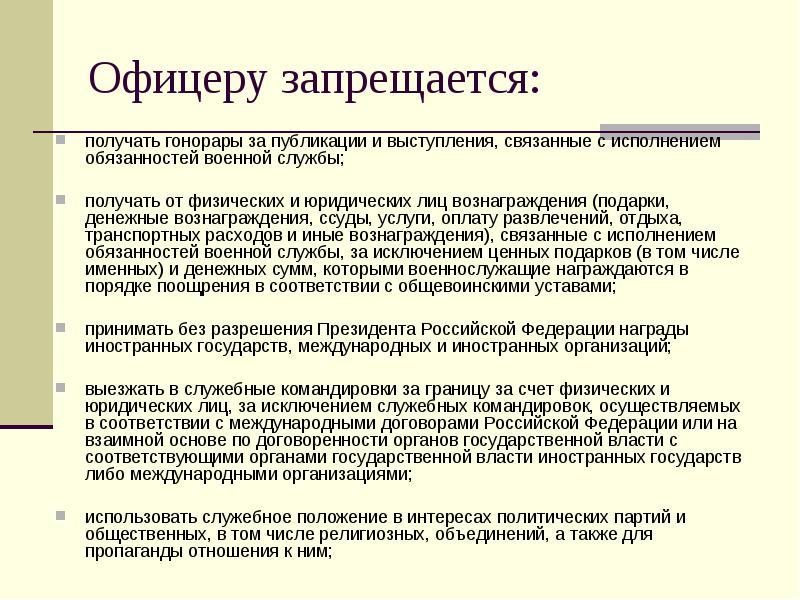
An officer does not perform the duties of military service in the event of:
a) unauthorized presence outside the location of the military unit or a place of military service established outside the military unit;
b) voluntarily bringing oneself into a state of intoxication;
c) the commission by him of an act recognized in accordance with the established procedure as socially dangerous.
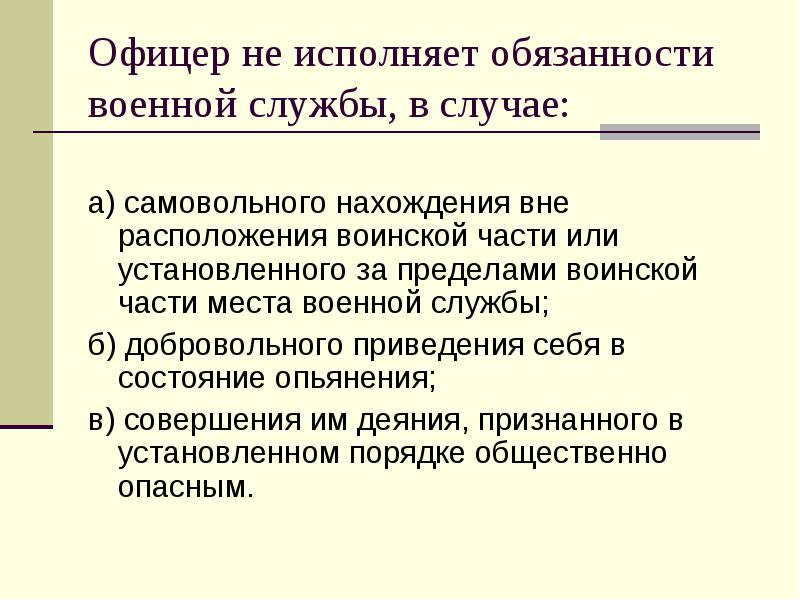
An officer can conclude a contract for a period of 1,3,5 years. The first contract is concluded for at least 5 years.
CONTRACT
about military service
1. _______________________________________________________________
(military rank, surname, name and patronymic
citizen (serviceman), date, month and year of birth)
voluntarily entered into with __________________________________________________
___________________________________________________________________
(name of the federal executive body)
represented by _____________________________________________________________
___________________________________________________________________
(position, military rank, surname and initials of the official)
this contract for military service in _________________
___________________________________________________________________
(in the Armed Forces of the Russian Federation, other troops, military formations or bodies)
for a period of _____________________________________________________________
___________________________________________________________________
(contract term)
2. _______________________________________________________________
(surname and initials of the citizen (serviceman)
voluntarily commits:
a) perform military service under the contract during the period established by this contract;
b) during the period of military service under the contract, conscientiously fulfill the general, official and special duties of military personnel established by legislative and other regulatory legal acts;
acts of the Russian Federation.
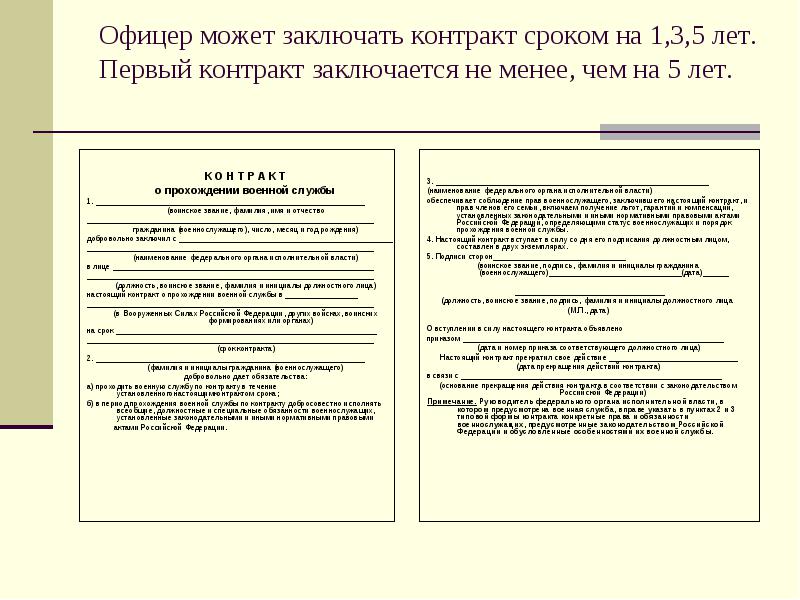
The reserve of the Armed Forces of the Russian Federation is created from among the citizens of:
dismissed from military service with enrollment in the reserve of the Armed Forces of the Russian Federation;
those who have successfully completed training under the military training program for reserve officers at military departments at federal state educational institutions of higher professional education and graduated from these educational institutions;
those who have not completed military service due to exemption from conscription for military service;
those who have not completed military service in connection with the provision of deferrals from conscription for military service or who are not called up for military service for any other reason upon reaching the age of 27 years;
dismissed from military service without military registration and subsequently put on military registration in military commissariats;
who have completed alternative civilian service;
females with a military specialty.
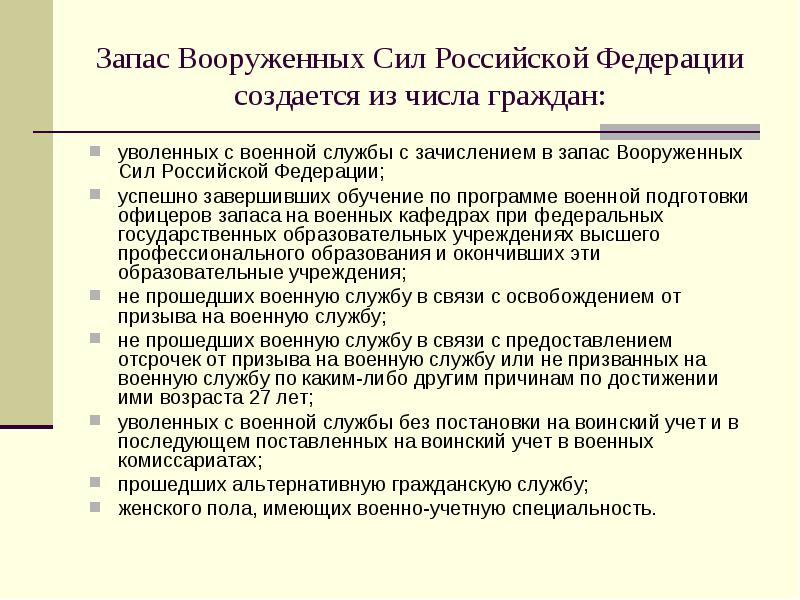
Citizens in the reserve are divided into three categories:
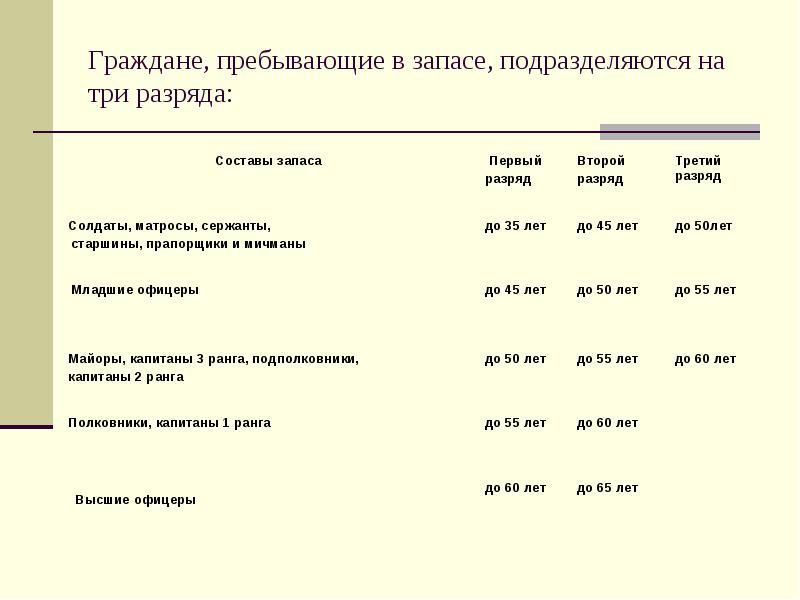
The procedure for assigning the next military rank to reserve officers.
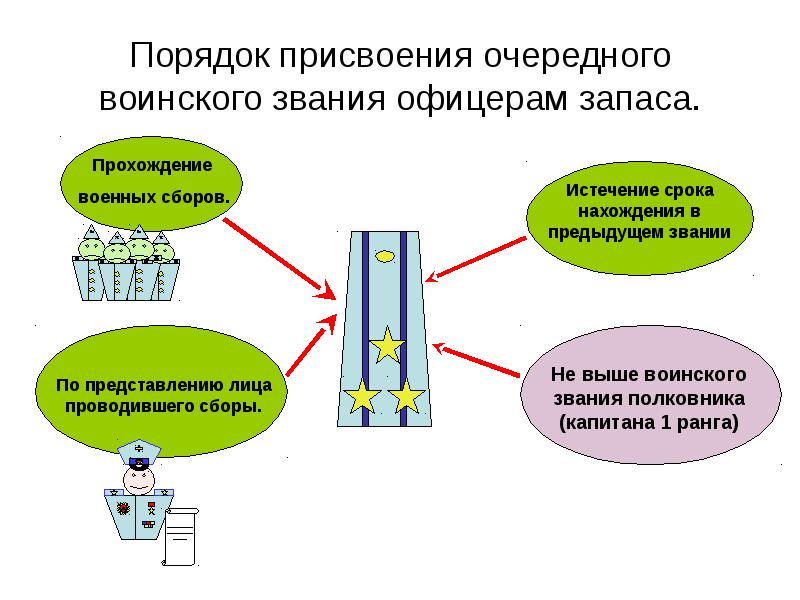
The following terms are established for being in the reserve in the following military ranks:
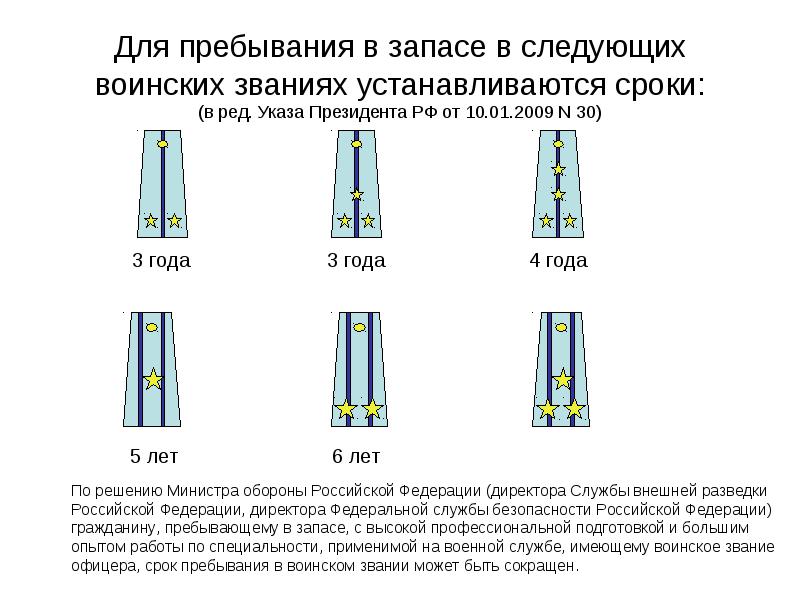
To prepare for military service, citizens who are in the reserve may be called up for military training.
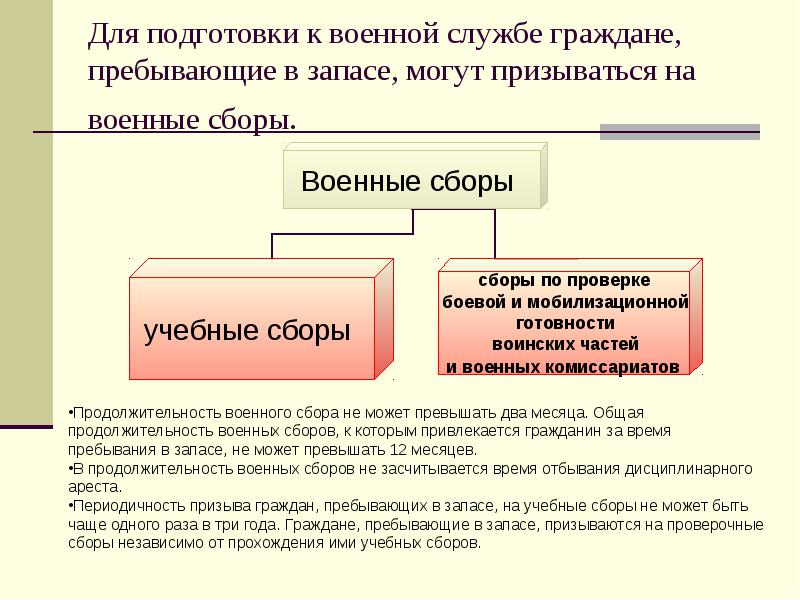
female citizens.
a) citizens reserved for public authorities, local authorities and organizations for the period of mobilization and in wartime;
b) employees of internal affairs bodies, the State Fire Service, institutions and bodies of the penitentiary system, bodies for controlling the circulation of narcotic drugs and psychotropic substances and customs bodies of the Russian Federation;
d) flight and technical staff, as well as workers and employees of aviation and railway transport, directly carrying out and providing transportation or engaged in the maintenance and repair of aircraft (helicopters), airfield equipment, rolling stock and railway transport devices;
e) the floating composition of the ships of the navy, as well as the floating composition of the river fleet and the fleet of the fishing industry - during the navigation period;
c) civilian personnel of the Armed Forces of the Russian Federation, other troops, military formations and bodies, as well as internal affairs bodies, the State Fire Service, institutions and bodies of the penitentiary system, bodies for controlling the turnover drugs And psychotropic substances and customs authorities of the Russian Federation;
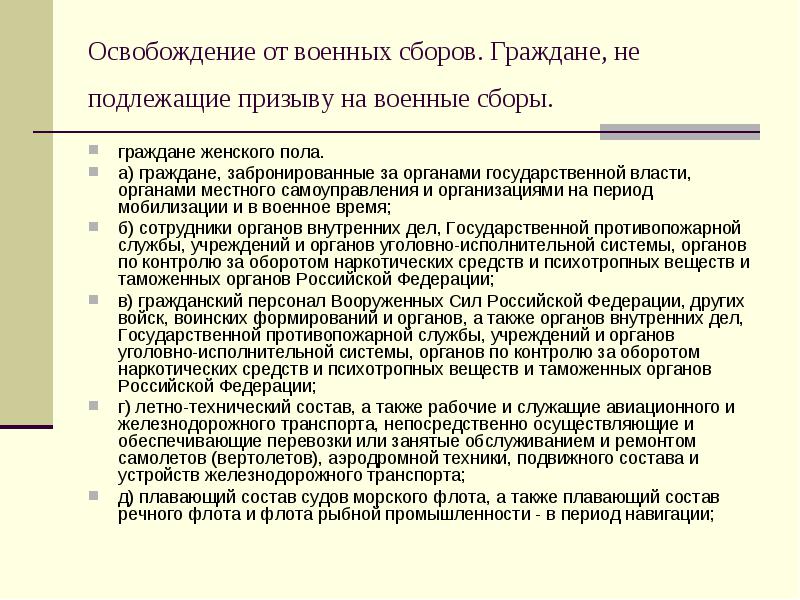
Exemption from military fees. Citizens who are not subject to conscription for military training.
f) citizens directly engaged in sowing and harvesting - during the period of such work;
g) citizens who are teaching staff of educational institutions;
h) citizens studying full-time and part-time (evening) forms of education in educational institutions;
i) citizens studying by correspondence in educational institutions - for the period of examination and credit sessions and writing a thesis;
j) citizens discharged from military service - within two years from the date of transfer to the reserve;
k) citizens who have three or more minor children;
m) citizens staying outside the Russian Federation;
n) members of the Federation Council Federal Assembly of the Russian Federation, the highest officials of the constituent entities of the Russian Federation (heads of the highest executive bodies of state power of the constituent entities of the Russian Federation), citizens temporarily acting as the highest official of the constituent entity of the Russian Federation (head of the supreme executive body state power of the subject of the Russian Federation);
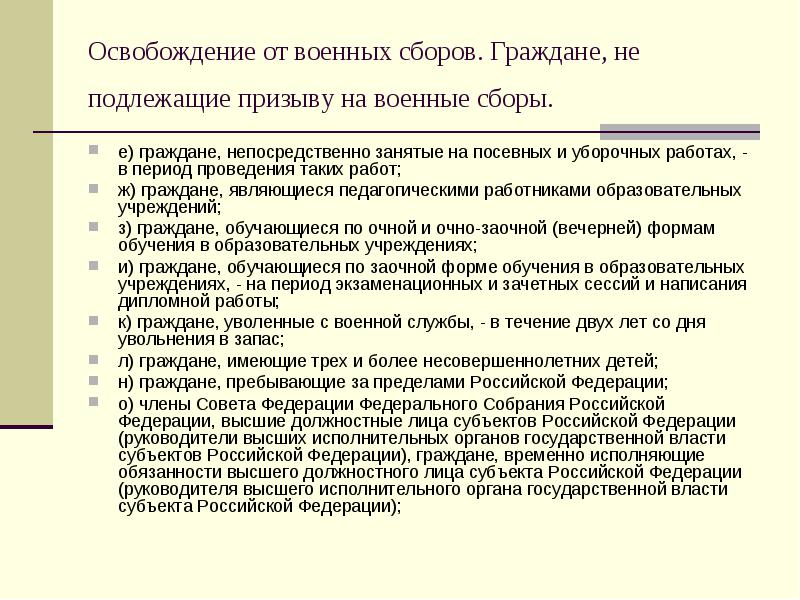
Military service is a legally regulated process of changing the legal status of servicemen in the performance of military service from the moment it begins to its end. The adventure of military service is connected with:
With the conclusion of a contract or conscription for military service;
With professional training;
With the assignment, change and deprivation of military ranks;
With movement in the service and to another locality;
With the performance of military service duties and rest time;
With certification of military personnel;
With dismissal from military service and reinstatement in military service.
Military service takes place within a certain period. The term is usually associated with the emergence, change or termination of military-service legal relations. The term of military service is the time during which military legal relations are valid.
For military personnel called up for military service, the duration of military service is determined by the Federal Law "On Military Duty and Military Service". The term of military service under the contract is determined by the period specified in the contract for military service.
The specifics of military service relations determined the peculiarities of the calculation of terms. From the moment the period of military service begins, a citizen becomes a serviceman with his own special legal status. The beginning of the term of military service is considered:
For citizens called up for military service who were not in the reserve - the day of departure from the military commissariat of a constituent entity of the Russian Federation to the place of military service;
For officers called up for military service from among those who graduated from educational institutions of higher professional education and enrolled in the reserve with the assignment of the military rank of officer - the day of departure to the place of military service specified in the order of the military commissariat;
For citizens called up for military service immediately after graduating from educational institutions of higher professional education, who were awarded the military rank of officer, the day of departure on vacation provided by the military commissariat upon graduation from these educational institutions;
For citizens who entered military service under a contract - the day the contract comes into force;
For citizens who have entered military educational institutions and have not completed military service or have completed military service earlier, the day of enrollment in educational institutions.
The duration of military service is determined on a calendar basis, and in cases established by federal legislation, on a preferential basis.
Military personnel entering military service are assigned military ranks. The legislation provides for the grounds for their assignment. These are: admission (conscription) to military service; graduation from a military educational institution of vocational education; expiration of military service in the previous military rank; special personal merits of a serviceman either as an encouragement (corporal, senior sailor), or ahead of schedule (not higher than the rank provided by the state for the position held), or one step higher than the rank provided for by the position held; the appointment of a serviceman to the highest military position if his term of service in the previous military rank has expired; re-certification upon entering the military service of a citizen who has completed law enforcement service (in this case, a military rank equal to his special rank may be awarded).
When conferring military ranks, certain conditions must be met. First, the holding by a member of the military of a military position for which the state provides a military rank equal to or higher than the military rank assigned to the soldier. Secondly, a prerequisite for conferring the next military rank is the length of service for the established period in the previous military rank, which is:
Five months - for an ordinary (sailor);
One year - for a junior sergeant (foreman of the 2nd article);
Two years - for a junior lieutenant, sergeant (foreman of the 1st article);
Three years - for a senior lieutenant, lieutenant, ensign (midshipman), senior sergeant (chief foreman);
Four years - for major (captain of the 3rd rank), captain (lieutenant commander);
Five years - for a lieutenant colonel (captain of the 2nd rank).
The military rank of a senior officer may be awarded to a serviceman after at least two years of his military service in the previous military rank and at least one year in the military position held, subject to replacement by senior officers. The terms of military service in the military rank of Colonel General (Admiral) and General of the Army (Admiral of the Fleet) are not established.
A feature of the passage of military service is a change in the official position of a serviceman, provided for by moving in the service and moving to a new place of service (including to another locality). Since the relocation may involve a significant change in the scope of duties, and payroll serviceman, it should be made only in accordance with the law.
The legislation provides for the following types of movement:
At the initiative of a serviceman (for health reasons in accordance with the conclusion of the military medical commission); By family circumstances at personal request; at personal request; in connection with enrollment in a military educational institution, postgraduate course, military doctoral studies);
At the initiative of the head (on the basis of official necessity; in the order of promotion; in connection with organizational and staffing activities; in connection with a planned replacement; in connection with expulsion from a military educational institution, postgraduate studies, military doctoral studies; transfer if, taking into account the nature of the crime committed, a serviceman who has been sentenced to a restriction in military service cannot be retained in a position related to the leadership of subordinates).
The movement of military personnel can be carried out to a higher position, to an equivalent position and to a lower position. In addition, the legislation provides for the transfer to a new duty station and service in another locality.
A serviceman may be transferred to a new place of military service and to another area in the following cases: according to business need; in order of promotion; for health reasons in accordance with the conclusion of the military medical commission; in connection with enrollment in a military educational institution, postgraduate course, military doctoral studies; in connection with the withdrawal from military educational institution, adjuncture, military doctoral studies; if, taking into account the nature of the crime committed, a serviceman who has been sentenced to a restriction in military service cannot be retained in a position related to the leadership of subordinates. And military personnel undergoing military service under a contract can also be transferred for family reasons at their personal request; at personal request; in connection with organizational measures; due to planned replacement.
A significant place in the passage of military service is given to attestation, the purpose of which is a comprehensive and objective assessment of military personnel undergoing military service under a contract, as well as officers undergoing military service by conscription, determining their compliance with their military position and prospects for further official use.
For military personnel undergoing military service under a contract, attestation is carried out every five years of military service, and upon expiration of military service - at least four months before its completion. Also, attestation is carried out at the end of a military educational institution, postgraduate studies and military doctoral studies.
Conscripted officers are certified when they are transferred to the reserve or at the conclusion of a contract.
The main tasks of certification of military personnel are:
Determining the compliance of military personnel with their military positions and the prospects for their further official use;
Selection of military personnel for appointment to military positions, determination of the expediency of concluding new
contracts with military personnel who have reached age limit stay in military service, as well as the selection of candidates for referral to study;
Creation of a reserve of candidates for nomination and direction for study;
Determination of the official mission of graduates of military educational institutions;
Presentation of military personnel for the awarding of state awards and the assignment of regular military ranks ahead of schedule and one step higher than the military ranks provided by the state for military positions;
An assessment of the reasons that may serve as a basis for the early dismissal of a serviceman from military service.
To conduct certification, as well as to resolve other issues of military service, certification commissions are created.
Legislation on military service establishes a special procedure and conditions for termination of military service. The grounds for termination of military service may be:
Dismissal of a soldier;
Capture or internment of a soldier;
Recognition of a serviceman as missing;
Death or death of a soldier.
Dismissal of military personnel is carried out:
To the reserve, if by the time of dismissal the serviceman has not reached the age limit for being in the reserve and, for health reasons, is fit or partially fit for military service;
Retire if the serviceman by the time of dismissal has reached the age limit for being in the reserve or is recognized for health reasons military medical commission unfit for military service;
From military service, if the serviceman is sentenced to imprisonment or restriction of freedom.
The grounds for dismissal are varied. They are associated not only with the terms of service or the age of a serviceman, his state of health, but also with other circumstances. All reasons for the dismissal of military personnel from military service can be divided into three groups.
1. Circumstances obliging officials to dismiss a serviceman from military service. These include:
Expiration of military service on conscription;
Reaching the age limit for military service for military personnel performing it on a voluntary basis (under contract);
Expiration of the contract for military service;
Expulsion from a military educational institution of vocational education;
State of health - in connection with the recognition of a serviceman by the military medical commission as unfit for military service;
Recognition by the military medical commission as limited fit for military service of a serviceman who is doing military service under a contract in a military position for which the state provides for a military rank up to and including senior warrant officer or senior midshipman, or undergoing military service by conscription;
Deprivation of a soldier of a military rank;
Entry into legal force a court verdict imposing a sentence of imprisonment on a serviceman.
2. Circumstances that provide an official with the opportunity to dismiss a serviceman from military service, taking into account an assessment of the reasons and the personnel situation. A soldier may be early dismissed from military service:
In connection with organizational and staff activities;
In connection with the entry into force of a court verdict on imposing a suspended sentence on a serviceman, as well as in connection with the entry into force of a court verdict depriving a serviceman of the right to hold military positions for a certain period;
In connection with the refusal of access to state secrets or the deprivation of the specified access;
In connection with the non-fulfillment of the terms of the contract by the military;
In connection with the transfer to the service in the internal affairs bodies, the State Fire Service, institutions and bodies of the penitentiary system, the bodies for controlling the circulation of narcotic drugs and psychotropic substances or the customs authorities of the Russian Federation and the appointment to the positions of ordinary or commanding staff;
How failed the test;
In connection with the transfer to the federal state civil service.
3. The right of a serviceman to be dismissed from military service, regardless of the desire of the leader. Dismissal at the initiative of a serviceman is possible on the grounds that arise:
In connection with a significant or systematic violation of the terms of the contract in relation to the serviceman;
In connection with the recognition of a serviceman belonging to the composition of officers, the military medical commission is limitedly fit for military service;
For family reasons;
In connection with the termination of military service during the period of its suspension;
In connection with the election of a conscripted military serviceman as a deputy State Duma of the Federal Assembly of the Russian Federation, a deputy of the legislative (representative) body of state power of a constituent entity of the Russian Federation, a deputy of the representative body of a municipality, or the head municipality and the exercise of these powers on an ongoing basis;
In connection with the empowerment of a military serviceman with the powers of the highest official of a constituent entity of the Russian Federation or his appointment as a temporary acting senior official of a constituent entity of the Russian Federation or his election (appointment) as a member of the Federation Council of the Federal Assembly of the Russian Federation;
In connection with the election of a serviceman as a deputy of the State Duma of the Federal Assembly of the Russian Federation, a deputy of the legislative (representative) body of state power of a constituent entity of the Russian Federation, a deputy of a representative body of a municipality or the head of a municipality and the exercise of these powers on an ongoing basis.
Military service ends on the day the serviceman is excluded from the lists of personnel of the military unit, bodies and institutions where military service is provided, in connection with dismissal from military service, death (death), recognition as missing or declared dead.





